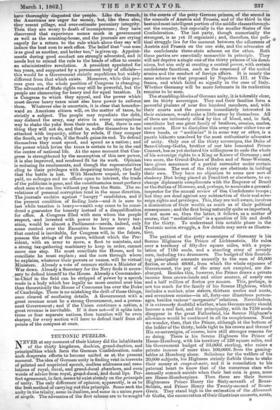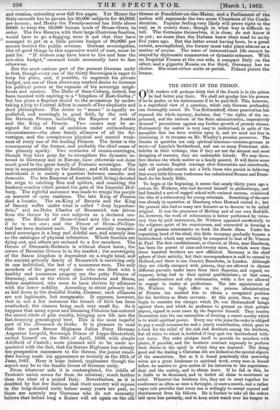TEUTONIC PUZZLES.
NEVER at any moment of their history did the inhabitants of the thirty kingdoms, duchies, grand-duchies, and principalities which form the German Confederation, make such desperate efforts to become united as at the present moment. The idea of German unity is finding vent in torrents of printed and unprinted speech, endless addresses and reso- lutions of royal, ducal, and grand-ducal chambers, and even words of advice from royal, grand-ducal, and ducal lips. Per- fect agreement, in fact, seems to exist already on the principle of unity. The only difference of opinion, apparently, is as to the best method of carrying out this principle. Some seek the unity in the trinity, some in dualism, and some in a union pure at simple. The advocates of the first scheme are to be sought in the courts of the petty German princes, of the second in the councils of Austria and Prussia, and of the third in the bestand most intelligent portion of the middle classes through- out the country, but especially in the smaller States of the Confederation. The last party, though numerically the strongest, is as yet ill organized ; and, therefore, the poli- tical struggle lies for the moment between the adherents of Austria and Prussia on the one side, and the advocates of the confederate three-state scheme on the other. Both these parties are essentially monarchic in principle.. They will not deprive a single one of the thirty princes of his domi- nions, but aim only at creating a central power, with certain confederate functions, such as the command of the united armies and the conduct of foreign affairs. It is nearly the same scheme as that proposed by Napoleon III. at Villa- franca, and which failed so signally in the case of Italy. Whether Germany will be more fortunate in its realization remains to be seen.
The stumbling-blocks of German unity, it is tolerably clear, are its thirty sovereigns. They and their families form a powerful phalanx of near five hundred members, and, with their courts and the persons immediately interested in their existence, would make a little army by themselves. All of them are intimately allied by ties of blood, and, in fact, constitute but one great family of brothers, cousins, uncles, and aunts. How to discipline this army under either two or three heads, or " mediatize" it in some way or other, is a puzzle hitherto unsolved by the most enthusiastic advocates of unity. Only one of the thirty sovereigns, the Duke of Saxe-Coburg-Gotha, brother of our late lamented Prince Consort, has as yet declared his willingness to cede the whole of his sovereign rights to a King or Kaiser of Germany ; and two more, the Grand-Dukes of Baden and of Saxe-Weimar, hhve given assurance of a partial surrender under certain conditions. The rest of the thirty are obstinate in holding their own. They have no objection to some new sort of shadowy Diet being placed at Frankfort or elsewhere, to ex- change diplomatic compliments with the Emperor of Brazil or the (Sultan of Morocco, and, perhaps, to nominate a general- inspector for the annual review of the. Confederate troops ; but they are dead against any subtraction of their real sove- reign rights and privileges. This, they are well aware, involves a diminution of their wealth as much as of their political consequence ; and the first being naturally quite as important, if not more so, than the latter, it follows, as a matter of course, that "mediatization" is a question of life and death for the thirty. To understand this notable phase in the Teutonic union struggle, a few details may serve as illustra- tion.
The pettiest of the petty sovereigns of Germany is his Serene Highness the Prince of Lichtenstein. He rules over a territory of fifty-five square miles, with a popu- lation of 7150 souls, and a standing army of seventy men, including two drummers. The budget of this flourish- ing principality amounts annually to the sum of 55,000 florins, or about 40001., from which the whole expenses of Goyernment, the pay of the army not excepted, are dis- charged. Besides this, however, the Prince draws a private income from crown-lands and other sources, of nearly one and a half million of florins per annum. This, perhaps, is not too much for the family of his Serene Highness which includes a mother, nine sisters, thirteen uncles and aunts, and seventeen cousins—in all, forty-one illustrious person- ages, besides various" morganatic" relations. Nevertheless, it is extremely doubtful whether, when German unity should become a real fact, and the principality, with its 7160 souls disappear in the great Fatherland, his Serene Highness's allowance would be continued in all its completeness. Need we wonder, then, that the Prince, although at the bottom of the ladder of the thirty, holds tight to his crown and throne I' His co-sovereigns, of course, have still stronger reasons for so doing. There is his Serene Highness the Prince of Hesse-Homburg, with his territory of 120 square miles, and his Government budget of 33,0001. sterling, who raises a private income of more than 100,000/. from the gaming- tables at Homburg alone. Solicitous for the welfare of his 20,000 subjects, his Highness strictly forbids them to stake their money at rouge-et-noir, and it is consolation to his paternal heart to know that of the numerous class who annually commit suicide when their last coin is gone, none are Hesse-Homburgians. Then there are their Serene Highnesses Prince Henry the Sixty-seventh of Reuss- Schleiz, and Prince Henry the Twenty-second of Reuss- Greiz. They stand high in the estimation of the Almanach de Gotha, the enumeration of their illustrious consorts, aunts, and cousins, extending over full five pages. Yet Henry the Sixty-seventh has to govern his 30,000 subjects for 40,0001. per annum ; and Henry the Twenty-second has little above 8000/. to keep the 39,000 human souls of Reuss-Greiz in order. The two Henrys, with their large illustrious families, would have to go a-begging, were it not that they have managed to get at a little private budget of 90,000/. per annum besides the public revenue. German sovereignties, like all good things in this expensive world of ours, must be paid for. "If tinkers may have leave to live and bear the Bow-skin budget," crowned heads necessarily have to fare otherwise.
But the most curious part of the present German unity- is that, though every one of the thirty Sovereigns is eager to keep his place, and, if possible, to augment his private budget, not one of them shows any marked desire to increase his political power at the expense of his sovereign neigh- bours and cousins. The Duke of Saxe-Coburg, indeed, has been taunted with aspiring to a "kingdom of East-Gotha ;" but has given a flagrant denial to the accusation by under- taking a trip to Central Africa in search of live elephants and dead philosophers. The desire to " annex " is equally re- pudiated, and seemingly in good faith, by the rest of the German Princes, including the Emperor of Austria and the King of Prussia. Two causes may be as- signed for this want of ambition under extraordinary circumstances—the close family alliances of all the So- vereigns, and the conspicuous physical and mental weak- ness of every one of the leading Princes. The latter is the consequence of the former, and probably the chief cause of the princely apathy. Two centuries of cousin-marriages, though they have gone far to strengthen the dynastic in- terest in Germany and in Europe, have otherwise not done much good to the great family of Teutonic sovereigns. The race is unquestionably on the decline ; and with many of the individuals it is merely a question between amentia and dementia. The late Emperor of Austria (still living) devoted his reign to catching flies and spiders, and counting the hackney-coaches which passed the gate of the Imperial Hof- burg. The rightful successor was made to resign the purple on account of open madness. The late King of Prussia died a lunatic. The ex-King of Bavaria and the King of Saxony suffer under what is called "deep hypochon- dria ;" and ex-Duke Charles of Brunswick was driven from the throne by his own subjects as a declared ma- niac. The Elector of Hesse-Cassel acts like a madman if lie is not one ; and the Prince of Hesse-Phillips- thal has been declared such. The list of mentally incapaci- tated sovereigns is a long and doleful one, and scarcely less so the catalogue of physical infirmities. Whole families are dying out, and others are reduced to a few members. The throne of Denmark-Holstein is without direct heirs ; the crown of Bavarian Greece is in the market ; the sovereignty of the Saxon kingdom is dependent on a single head, and the ancient princely family of Brunswick is surviving only in one individual, the last of a numerous race. The only members of the great royal class who are blest with a healthy and numerous progeny are the petty Princes of Germany, such as the rulers of Lichtenstein and Reuss, before mentioned, who seem to have thriven by alliances with the lower nobility. According to strict princely law, as laid down in the dreadful Gotha Almanac, such alliances are not legitimate, but morganatic. It appears, however, that in not a few instances the breach of faith has been overlooked, the sinners being such very small fry. So it happens that many a poor and blooming Fraulein has entered the sacred circle of pale royalty, bringing new life into the fast-decaying genealogical tree. This is the most hopeful part of the Almanach de Gotha. It is pleasant to read that the most Serene Highness Julius Peter Herman Augustus Leopold, Sovereign Prince of Lippe-Biesterfeld, united himself on the 30th of April, 1839, with simple Adelheid of Casten; more pleasant still to be made ac- quainted with the fact, that his Serene Highness has already ten prospective successors to the throne, the junior candi- date having made his appearance as recently as the 19th of June, 1881. Here is hope indeed, unpleasant though the aspect may be to the fanatic lovers of German unity. From whatever side it is contemplated, the riddle of Teutonic union seems far from its solution; much farther than the ideal of a united Italy. Nevertheless, as it is doubted by but few Italians that their country will rejoice in the long-desired unity before many years are past, so there are scarcely any Germans who do not earnestly believe that before long a Kaiser will sit again on the old throne at Frankfort-on-the-Maine, and a Parliament of the nation will supersede the two score Chambers of the Confe- deration. Popular feeling very likely will prove right in the end, as it mostly does ; though in what way is difficult to tell. The Germans themselves, it is clear, do not know it as yet ; no more than the Italians knew their road to unity five years ago. But the latter event having been, to a great extent, accomplished, the former must take place almost as a matter of course. The wave of international life cannot be stayed by diplomatic manceuvres or dynastic schemes. With an Imperial France at the one side, a compact Italy on the other, and a gigantic Russia on the third, Germany has no choice. She must either unite or perish. Poland points the lesson.































 Previous page
Previous page